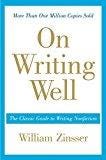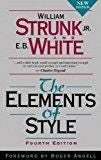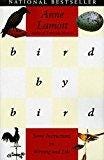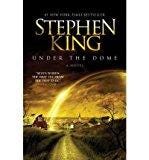Writing Well
Whether you are just starting out as a writer or are already an expert, these books provide helpful techniques on craft and style to improve, optimise and transform your writing.

On Writing Well: The Guide to Writing Nonfiction by William Zinsser

Often quoted as ‘the writers’ bible’, On Writing Well is a classic for both the aspiring writer and seasoned writer. It prescribes core ground rules for elegant writing on any genre, particularly nonfiction. Its clear, practical and encouraging guidance together with timeless advice on crafting engaging writing makes it mandatory reading for anyone who is required to write on a daily basis. The most valuable lessons learnt from the book:
- Clarity of thought is the pre-requisite to clear, concise writing and effective communication.
- Paragraphs must be trimmed to make them visually appealing to the brain.
- Be confident in the purpose of your writing, and write about what you are passionate and enjoy.
- Writing is a craft — it takes time to perfect the skill. Writing every day is crucial to developing and perfecting it. Practice makes perfect.
- Your main sources of inspiration are people and places. Observe them and experience them to create a truly authentic narrative.
Grab your copy here.
The Elements of Style by William Strunk Jr

The gold standard of writing well, this book clearly sets out all the rules that will transform your writing from good to great using the sheer power of editing. The four pieces of evergreen advice that stood out:
- Remove any unnecessary words and sentences including any irrelevant detail. Conduct a critical review and see if you can say more with less words and do not be afraid of deleting large chunks of writing if it can be said simply and in less words.
- “The colon has more effect than the comma, less power to separate than the semicolon, and more formality than the dash.”
- Always choose the active voice over the passive voice. For example, instead of saying that “conclusion on the verdict could not be reached”, say “No verdict was reached.”
- Use positive statement rather than negative statement. For example, instead of saying “the bus driver was unable to stop at the traffic lights”, say “the bus driver drove straight through the traffic lights!”. You can see which sentence is more powerful. Clear and concise writing is the end goal.
Grab your copy here.
Bird by Bird: Some Instructions on Writing and Life by Anne Lamott

Inspired by her ten year-old brother’s school assignment on writing a report on birds, this is a phenomenal guide by Anne Lamott on every aspect of writing from getting started, to working with writer’s block to final publication. Filled with humour and inspiring quotes, these were the four gold nuggets of inspiration I took away from the book:
1. Your writing should always reflect some level of hope, as this is what leaves readers inspired and engaged.
2. Writing should become habitual and this can only be achieved by writing every day, setting a routine and striving to get that first draft out even if it feels ‘crap’.
3. Write as though you are dedicating the writing to your favourite author who has inspired you.
4. Writing is about being true to yourself — write with authenticity and tell your truth. Do not let what other people think of your writing get in the way.
A gracious book that will reassure you, reignite your faith in your writing and make you feel like you can complete a great piece of writing that will resonate with your readers.
Grab your copy here.
On Writing: A Memoir of the Craft by Stephen King

For those of you who are interested in writing great fiction, Stephen King’s memoir on writing is a must-read. A highly engaging biography of what it has taken Stephen King to become the writer he is today. From his childhood days, where his sole focus was to master the art of storytelling, to how writing helped his recovery from a road accident in 1999. The memoir focuses on the art of writing revealing important insights about writing well:
1. Making time to read is crucial to writing well and acquiring necessary writing tools. 5 hours a day should be spent reading and writing.
2. The secret to writing great description is about knowing when to stop so that the reader’s imagination can take over from the writer’s.
3. Finding a great editor is game-changing.
4. Kill the adverbs.
Filled with personal anecdotes as well as lots of information on character development, structuring a fictional plot, to creating good writing habits and dealing with rejection. You will want to re-read this even before you have finished it.
Grab your copy here.
More book prescriptions can be found at our A-Z of Book Prescriptions.
A big hello and thank you for reading! Passionate about literature, psychology, and life I launched Book Therapy as an alternative form of therapy using the power of literature. I train mental health professionals, librarians, teachers as well as readers on using bibliotherapy in their own work through our online Bibliotherapy, Literature and Mental Health course. We also curate reading lists/personalised book prescriptions for clients based on their individual needs. This is our signature personalised reading service.
You can also check out Book Therapy’s other free reading lists and A- Z of book prescriptions (covering both fiction and non-fiction). These suggest books based on your existing life situation (e.g. anxiety, job change, relationship heartache) as well as interests (e.g memoir, historical fiction, non-fiction, crime etc). There’s also a Children’s A — Z of Book Prescriptions. Feel free to check out the blog for more literary gems. There’s also a post on my personal story of how I entered the world of bibliotherapy and book curation.
In this role, I have had the opportunity to publish a book called The Happiness Mindset, and write various literary essays and pieces for newspapers and magazines. I have undertaken bibliotherapy workshops for The United Nations, various libraries in New York and corporate organisations in the UK and US. My book recommendations have featured in the Guardian, Marie Claire, NBC News, Asian Voice, New York Observer, Sydney Telegraph and various other publications. If you are a parent you might enjoy a podcast I’ve recorded with speech and language therapist Sunita Shah on Raising A Reader & Storyteller. And if you’d like to connect, email me at bijal@booktherapy.io or www.booktherapy.io.
Book Therapy is a participant in the Amazon EU, US and Canada Associates Programme, an affiliate advertising programme designed to provide a means for sites to earn advertising fees by advertising and linking to Amazon.co.uk, Amazon.com and Amazon.ca
